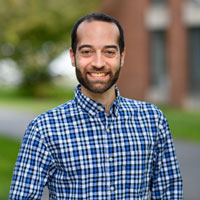
PhD Candidate, Princeton University
Highlights from Undergrad
- Member of the Unix Users Group
- Teaching Assistant 2010-2011
- Winner of the CS Exceptional Graduate Award (2012)
- Winner of the CS Dennis Ritchie Award (2012)
What are you doing in your current position?
I’m at Princeton working on a PhD in Psychology and doing my research in the Neuroscience Department on the intersection of machine learning and cognitive science. My most recent paper is about using language models from machine learning to understand how the brain processes language. What we’ve found is that when people are listening to someone talk, their brain naturally predicts the next word hundreds of milliseconds before it’s perceived. We also found that the brain represents words based on the previous words it hears. These two principles are shared between the brain and language models, suggesting they are good candidates for studying language in the brain.
I'm also using machine learning to model how biases in the way people think of concepts emerge from real-life contexts, and how these biases may impact communication and understanding. For example, how might two people come to have two different perspectives of what “freedom” is? I’m exploring the idea that the various contexts where people encounter “freedom” affects what it means to them. And if these differences exist, would it make conversations between people less successful? I’m using language models and a large corpus of news transcripts to answer these questions.
What were some of your formative experiences in the JMU CS program?
TAing was a great experience for me in JMU because I was able to help people and see them succeed - some of them even reached out years later to thank me. Besides the teaching experience itself, it also forced me to think about other ways to explain complicated ideas. This helped increase my understanding of the people I was working with and improved my communication skills.
Like many others, my most enjoyable experience in the CS program was taking classes with Dr. Bernstein. I did an independent study with David, where I was interested in using computer vision to recognize hand gestures. I learned a lot about advanced CS methods, like computer vision pipelines and hidden markov models. Later on, in David’s Developing Interactive Multimedia class, I used these tools to create an “Interactive Fish Tank” project where animated fish would swim around and respond to the person viewing them via the webcam.
What do you wish you had known in undergrad?
I think CS students should consider a double major. Learning how to program gives you a powerful skill and incredible potential to solve problems. Research in CS for the sake of CS is of course beneficial; however, I always wanted to use CS as a tool to understand something else: Biology, Chemistry, Neuroscience, etc. People are beginning to realize that knowing even a little bit of programming is very helpful to automate tasks or better understand data. As computer scientists, we have the expertise to build systems or solve technical problems, but you get to choose where to apply this tool.
What advice do you have for current JMU CS students?
When I was a senior, I wasn’t aware of all the options I had and I didn't spend much time thinking about what I was most passionate about. After I graduated I went to work at IBM, which turned out to be more corporate than what I wanted. So I went to a small consulting security agency in DC. I really enjoyed the work and culture for a few years, but I found that consulting work didn’t change much nor was it challenging enough. I wanted something new. So I applied to a master’s degree in machine learning at Georgia Tech. When I was accepted, I quit my job and became a part-time student while I traveled. I road-tripped through Canada, explored South and Central America, and visited several national parks in the US — all while I was doing my master’s. It was tough to balance, but I enjoyed meeting people from other countries on the road, learning about their cultures, and studying machine learning ideas.
During these travels, I realized I enjoyed research and reading papers. That's when I decided to go to Princeton — first as a Research Engineer while I completed my master’s, and then as a graduate student in their PhD program. So I did a lot of exploring to find out where I wanted to be. My advice to current students: really look at all the different opportunities. Explore what’s there, think about what you want, talk to other people, and most importantly, aim high. It might be easy to go into industry, but there are so many exciting avenues to explore with a CS degree.
